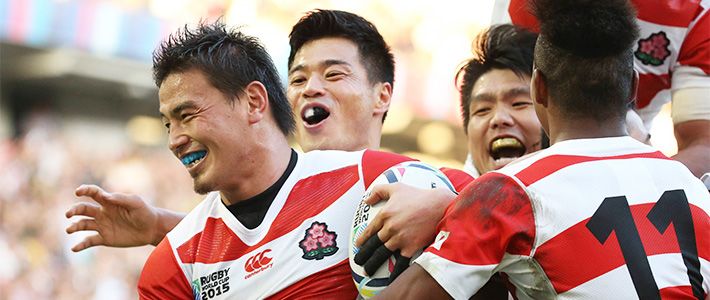
The Eddie Jones Effect: Japanese Rugby Success Built on Coach’s Local Knowledge
Sports- English
- 日本語
- 简体字
- 繁體字
- Français
- Español
- العربية
- Русский
Rugby in the Spotlight
Japan’s team left a strong impression at the 2015 Rugby World Cup held in England. In the previous seven tournaments it had managed just one victory, against Zimbabwe in 1991, and was widely regarded as being among the minnows this time. But Japan stunned fans around the world with an extraordinary 34–32 win over rugby giants South Africa in its opening match. Despite a loss against Scotland in the following game, it also managed to defeat the higher-ranked Samoan team and beat the United States to finish the tournament’s first round with three victories.
Falling short in the point differential, Japan was ultimately unable to meet the target set by Australian head coach Eddie Jones of reaching the quarterfinals. But the atmosphere surrounding the nation’s rugby has changed dramatically.
Fullback Gorōmaru Ayumu in particular has become a celebrity for his fine performances, while also drawing media interest for his regular routine before taking place kicks. Even popular “wide shows” (general interest television programs) gave extensive coverage to the press conference in which he announced that in 2016 he will join Australia’s Queensland Reds, which compete in the Super Rugby competition.
Jones also made the move to Super Rugby after announcing at the outset of the World Cup that he would leave the top Japan post, being named the head coach of the Stormers from Cape Town, South Africa. [On November 20 his plan changed again with the news that he would coach England’s national team.—Ed.] Speculation over his successor in Japan is drawing the same interest as for the national soccer coach. Jones spurred his team on by saying that their victories at the World Cup could change Japanese history, and his words have become reality.
The Importance of Local Knowledge
How was Jones able to achieve such a level of success? I spent more than 10 hours in interviews with him in the first half of 2015, when he told me that to become national team coach, two absolute requirements were to have prior coaching experience in that country and to have won tournaments as a coach. He also said that it is important to adapt quickly when starting at the international level.
 Eddie Jones (left) gives instructions at a training session in Gloucester, England, on October 10, 2015, the day before Japan’s World Cup match against the United States. (© Jiji)
Eddie Jones (left) gives instructions at a training session in Gloucester, England, on October 10, 2015, the day before Japan’s World Cup match against the United States. (© Jiji)
Jones’s Japanese coaching career began with Tōkai University. After going home to Australia, where he led the national team to the World Cup final in 2003, he returned to Japan and won the Top League as coach of Suntory Sungoliath. He told me that it was important for national coaches, not only of Japan, to have a good knowledge of the country’s rugby gained through coaching experience at the club level.
Eddie Jones was not Japan’s first foreign rugby coach. In the 2011 World Cup, the team was led by John Kirwan, a legendary player for the New Zealand All Blacks. Unfortunately, his team lacked flair and failed to record a single victory. This may have been simply due to a difference in coaching ability. I think, however, that Jones’s sharp observation of Japanese players was a factor in his success.
Harsh Words to Inspire Mental Strength
In 1996, while Jones was at Tōkai University, he also joined the Japanese national team’s coaching staff. At the age of 36, he took charge for a Pacific Rim Championship match in which the United States thrashed Japan 74–5 even though the teams were thought to be around the same level and Japan had won 24–18 against the same opponents a few weeks earlier. It was a seemingly inexplicable result, but Jones believed that the reason for defeat lay in the team’s preparation for the match.
He says that, as at other teams, he had avoided pushing them too hard in the week leading up to the match. As a result, the players lacked a sense of urgency in their performance and failed to meet test rugby standards. This experience taught him that pushing Japanese players is the way to bring out their ability.
In 2012, Jones became Japan’s head coach and changed his approach to the players, keeping a firm grip on the reins. Even when training overseas shortly before matches, he would yell at the players to sprint and, if he thought they were not giving their all, would bluntly tell them that if they wanted to jog they should go back to Japan.
I have also seen him encouraging players to take responsibility by saying that he will not change them—that they need to change themselves. The coach’s harsh words have certainly led to a loss of motivation in some players. At the same time, Jones knew that they would inspire the mental strength required to meet the challenges ahead.
Related Tags
sports World Cup rugby Eddie Jones Goromaru Ayumu Michael Leitch

